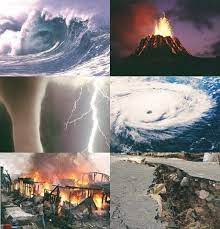Natural disasters Do's and don'ts
Natural disasters are events caused by natural processes
that result in the loss of life, property damage, and disruption of normal
activities. They can occur anywhere in the world and can have a significant
impact on communities and the environment.
There are several types of natural
disasters including
Geophysical disaster
· Earthquakes
· Volcanic
eruptions
· Tsunamis
Hydrological disasters
· Floods
· Flash
Floods
· Mudslides
Meteorological disasters
· Hurricanes
· Typhoons
· Tornadoes
· Thunderstorms
· Hailstorms
· Heat
waves
Climatologically disaster
Droughts
Forest fires
Biological
disasters
Disease outbreaks
· Pandemics
· Infestations
of pests
· Space-related disasters
Solar flares
Meteor impacts
It is important to note that some natural disasters, such
as hurricanes and earthquakes, can trigger other types of disasters, such as
landslides and tsunamis. Additionally, some natural disasters, such as
droughts, can lead to food shortages and famine.
Do’s
and don’ts
During a natural disaster, it's important to
follow some guidelines to stay safe. Here are some dos and don'ts that you
should keep in mind:
Do's:
1. Stay informed: Keep track of updates from local
authorities and official sources about the disaster, its extent, and the
recommended actions.
2. Evacuate if instructed: Follow the evacuation orders
issued by the authorities. If you are in a flood-prone area, move to higher
ground.
3. Prepare an emergency kit: Make sure you have food, water,
first-aid supplies, and other essentials ready in case you need to evacuate.
4. Secure your home: Close and lock windows and doors, turn
off gas and electricity if instructed to do so, and bring outdoor objects
inside to prevent them from becoming dangerous projectiles.
5. Help others: Check on your neighbors, especially the
elderly and those with disabilities, to make sure they are safe and have what
they need.
Don'ts:
1. Don't panic: Stay calm and think clearly about what you
need to do.
2. Don't ignore evacuation orders: If you are told to
evacuate, do so promptly.
3. Don't touch fallen power lines: Stay away from power
lines and electrical wires, as they can be dangerous.
4. Don't drive unless necessary: Avoid driving during a
disaster, as roads may be blocked or flooded.
5. Don't use candles or open flames: If the power goes out,
avoid using candles, as they can start a fire. Use flashlights instead.
6. Remember, during a natural disaster, the most important
thing is to stay safe and protect yourself and your loved ones.

Fahad writes keep it up 👍🏼
ReplyDelete